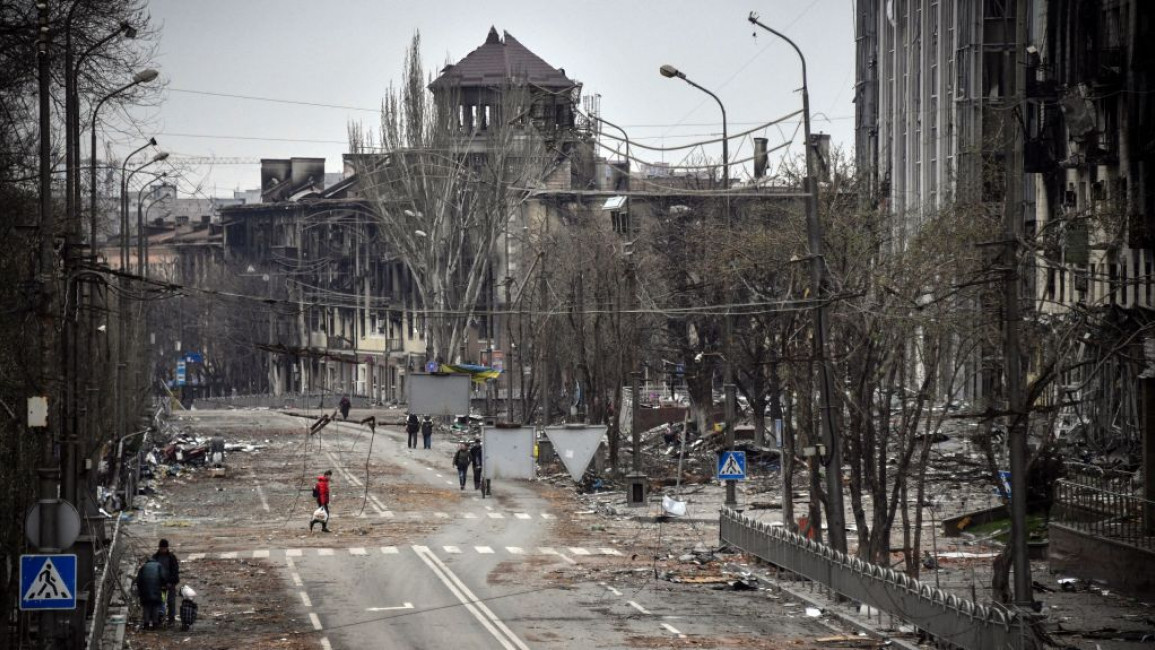Ukraine: Russia suspected gas attack claim reminds Syrians of their own chemical massacres
Unconfirmed reports that Russia used chemical weapons in the besieged Ukrainian city of Mariupol this week have brought back frightening memories for Syrians.
Russia and its separatist militia allies have denied claims that they used chemical weapons on Monday, which were originally made by the far-right Azov Batallion, currently defending Mariupol.
US, UK, and Ukrainian intelligence are currently investigating the claims.
Ukrainian Deputy Defence Minister Hanna Maliar said early inquiries suggested "it is possible" phosphorous munitions were used, though this is an incendiary weapon rather than a chemical one.
For Syrians, the panic caused by the alleged chemical attack brought back their own nightmares.
"Sadly, the news of an alleged chemical weapons attack by Russia in Ukraine comes as no surprise to Syrians," Sara Hashash, communications director at The Syria Campaign, told The New Arab.
While Russia itself has not used chemical weapons in Syria, it intervened militarily in support of dictator Bashar Al-Assad in 2015. Assad regime forces have used chemical weapons on numerous occasions in the Syrian conflict - including the nerve agent sarin - killing hundreds or thousands of people.
"The Syrian regime has a dark track record of carrying out horrific attacks on civilians using internationally banned chemical weapons in flagrant violation of international law," Hashash said.
Hamish de Bretton-Gordon, a chemical weapons expert and former commander of the UK's chemical and biological defence regiment, was unsurprised at the allegations against Russia but added that he hadn't seen evidence to prove a chemical attack occurred.
"Aleppo is about the same size as Mariupol. The four-year siege of Aleppo was broken by 13 days of chemical weapons use – chlorine barrel bombs," he said.
These were used by Syrian regime forces fighting to retake the city from rebels in 2016. De Bretton-Gordon said that although the regime carried out the chemical attacks, Moscow would be aware of this.
"So, although Russia did not drop the chlorine itself, it was sort of done on its watch, so they would certainly know it was happening," he added.
"And I think, the important thing [is], they saw how successful [this was]. Chemical weapons are morbidly brilliant weapons if you have no morals or scruples."
The Syrian regime has repeatedly used chemical weapons since the Syrian conflict broke out in 2011, with the US saying this has happened "at least 50 times".
In August 2013 the suspected use of sarin in Eastern Ghouta, near the capital Damascus, claimed over 1,400 lives.
"I think the roots of the invasion of Ukraine go back to then, because I think the Russians generally thought that the West was weak and wouldn't do anything about it, and that was proved then," de Bretton-Gordon said.
Syrian Network for Human Rights chairman Fadel Abdul Ghany said that Syria was a test, one that the international community failed.
"We should always remember the red line committed [to] by Obama, the president of the US, when he repeatedly said the use of chemical weapons is a red line," he said, referring to the lack of response from the US after the massacre.
"And then, when the Assad regime violated this red line, what happened? Nothing, actually, except condemnation via statement."
Amnesty International UK crisis response manager Kristyan Benedict said it was vital that "credible investigators... establish the facts and properly preserve any evidence" in Mariupol.
If proof of a Russian chemical attack in Mariupol is found then Moscow, which is already reeling from heavy Western sanctions over its invasion of Ukraine, can expect further calls for accountability.
But Benedict said that in the Syrian case, despite the Kremlin's military and diplomatic backing of the regime, the "so-called 'civilised' world" continued investing in Russia and let it host FIFA's 2018 World Cup.
"Most states got a lot wrong in Syria, including failing to support regional and international justice initiatives properly," he said.
"Syrian civilians continue to pay a horrible price for the impunity Russia has been allowed to enjoy. The international community must not make the same mistake with the crisis in Ukraine."




